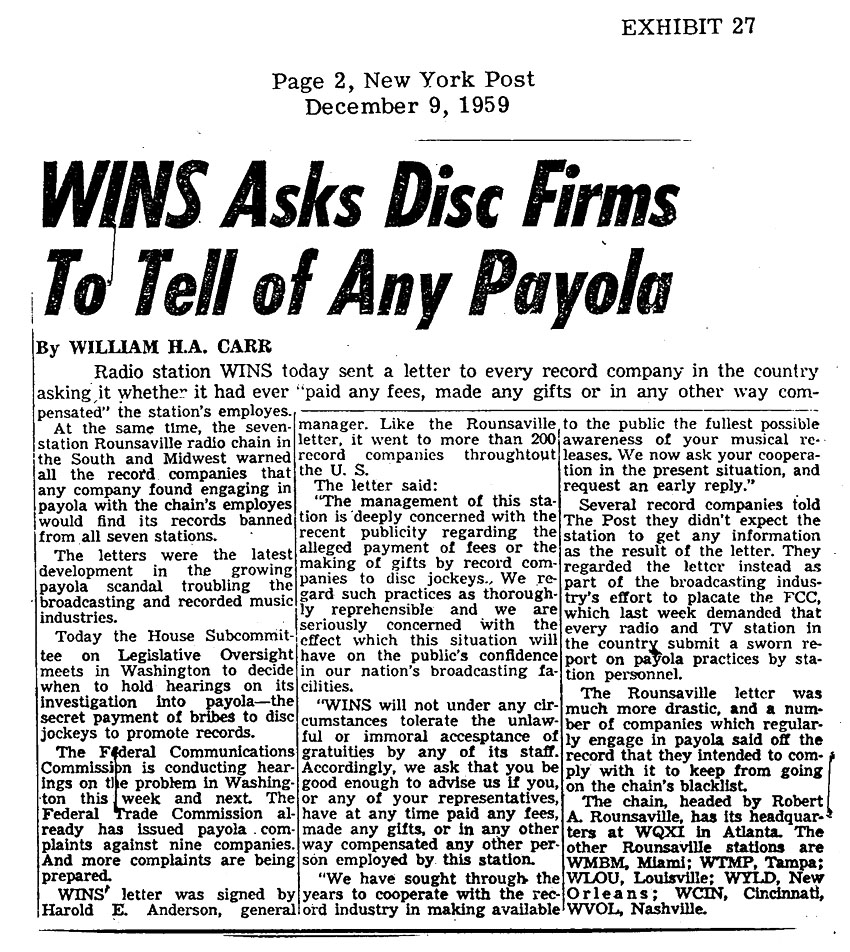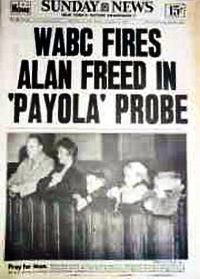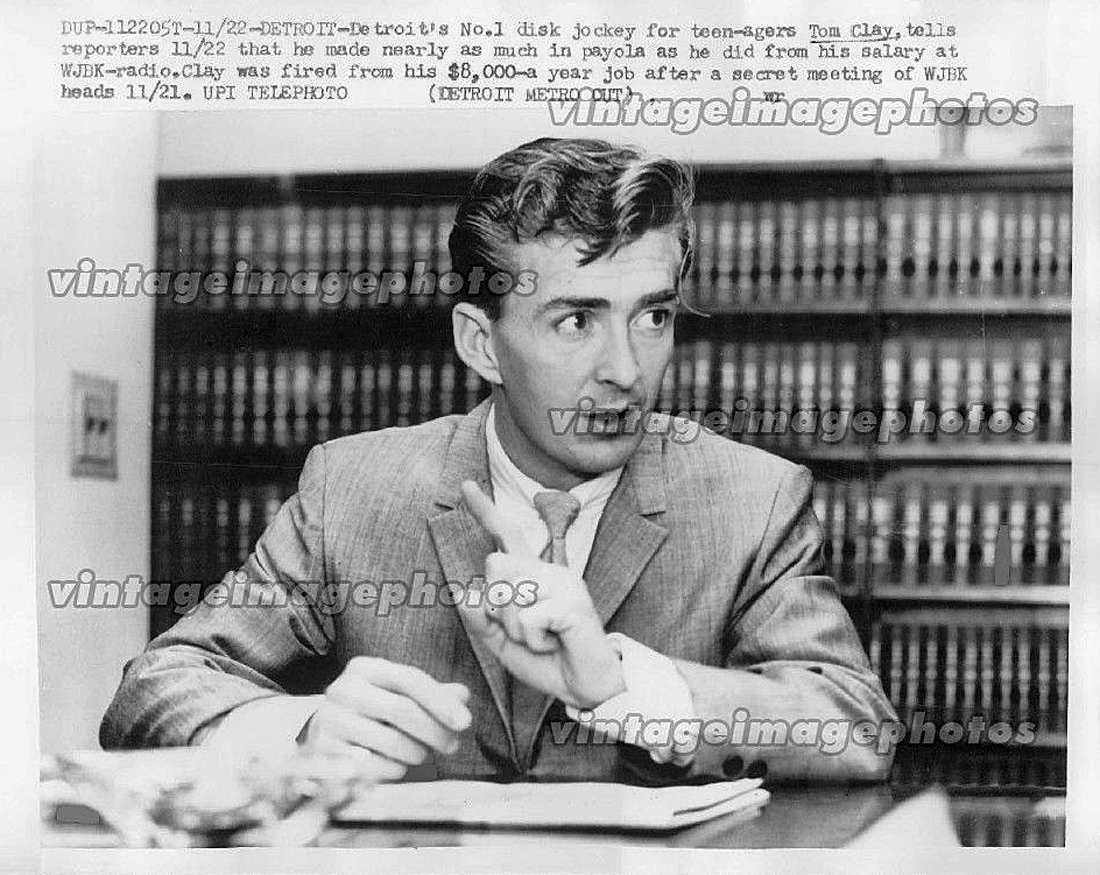
![]()
 From the MCRFB NEWS archive: 1959
From the MCRFB NEWS archive: 1959
Spells Hefty Career Damage For Many; Finis For Some; Policy Shifts Likely
NEW YORK — Judging by events of the past week, one effect of the current deejay-payola probe is likely to be that of at least 25 disk jockeys (ranging in importance from the moderate to the biggest names), program directors, record execs and publishers will have been substantially damaged as far as their careers in the music business is concerned.
Some will recover, but other may truly “go down the drain,” in the words of Alan Freed, who lost both his jobs at WABC and WNEW-TV last week.
Budget Angle
 One of the most immediate effects of the probe may very well be a sharp decrease in the number of local record-hop type shows. Freed’s parting with WNEW-TV was said to have been at least partially sparked by AFTRA’s ruling that Freed (who reportedly was paid only $450.00 weekly for six-hour long daily TV shows) paid scale (about $140) to each act for lip-synching to records on his show.
One of the most immediate effects of the probe may very well be a sharp decrease in the number of local record-hop type shows. Freed’s parting with WNEW-TV was said to have been at least partially sparked by AFTRA’s ruling that Freed (who reportedly was paid only $450.00 weekly for six-hour long daily TV shows) paid scale (about $140) to each act for lip-synching to records on his show.
Freed — and many other TV record hop emcees across the country — usually had from four to eight disks guests daily, thereby posing a practically impossible budget problem.
In line with this, station WJBK, Detroit, has said it had no intention of scheduling another “Detroit Bandstand” show replacement for emcee Dale Young, who resigned from that station last week, refusing to comment on the reason for his exit.
Tom Clay was fired from WJBK over the weekend, after he admitted accepting payola. Clay admitted he received about $6,000 over the last year and a half from small record companies. Another Detroit broadcaster, Jack Le Goff, was fired last week from WJBK after he aired an editorial defending payola “as a part of American culture.” Still another Detroit radio jock, Dom McLeod, resigned also from WJBK last week, making three spinners out in a 36-hour period.
Other Resignations
Although the payola probe wasn’t necessarily involved, several other deejays resigned from stations across the country last week. Joe Niagara moved his previously announced December 19 resignation date (from WIBG Philadelphia) up to last Monday (November 23) following a conference with WIBG managing director John C. Moler.
Three of Boston’s top jocks (Stan Richards, Bill Marlowe, Joe Smith) were given notice by WILD,in what was described as a move “to de-emphasize the role of the deejays and to emphasize the role of the station from now on.”
The WILD story suggests what many in the trade believe to be a strong possibility — namely that the probe may result in the selection of music being taken out of the hands of individual disk jockeys and program directors almost entirely.Confronted with a threat to their FCC licenses, station management may decide the only solution is to ride herd on record programming personally.
It has been suggested that they elimination of payola will mean the return of “good music” (i.e. non-rock and roll) to radio. However, station management usually places more emphasis on the importance of ratings than anybody else in a radio operation, so the only conclusion is that they will give the public what surveys and rating indicate it wants to hear — be it rock and roll, far-out jazz or the minuet. Ratings services, of course, have also been recently been accused of hanky panky.
‘Payola’ Not Defined
The word ‘Payola’ itself has yet to be defined. Some stations believe it perfectly proper for jocks to have ownership interests in publishing companies, record firms, distributing outfits, etc. — as long as they don’t infringe on station programming; while other consider such activities just as much a part of payola as cash on the line.
 For example, John V. B. Sullivan, general manager of WNEW, New York, says he doesn’t consider it real payola “unless it affects the music.” Consequently, said Sullivan, he has no objections to WNEW jockey Lonnie Starr’s ownership in a couple of firms. Because his investigations have shown they don’t show up on his radio program. In fact, notes Sullivan, last year the firm actually cost Starr $400.
For example, John V. B. Sullivan, general manager of WNEW, New York, says he doesn’t consider it real payola “unless it affects the music.” Consequently, said Sullivan, he has no objections to WNEW jockey Lonnie Starr’s ownership in a couple of firms. Because his investigations have shown they don’t show up on his radio program. In fact, notes Sullivan, last year the firm actually cost Starr $400.
Sullivan also said that, “I don’t care if Frank Sinatra wants to give WNEW jockey Bill Williams a Cadillac because Williams would be playing Sinatra record already — thus such a gift wouldn’t affect the music.”
Westinghouse View
On the other hand Westinghouse Broadcasting last week said, “WBC does not condone disk jockeys’ ownership of record companies, distributing companies, publishing companies or ownership of talent. That is because of the actual or potential conflict of interest between ownership on the one hand and the creative selection of programming on the other.” Westinghouse did not say if it would take any action if investigation reveals that any of it’s jockeys are involved in such outside activities.
Harold Anderson, general manager of WINS, New York, agrees with WNEW manager Sullivan, in that he doesn’t think ownership of labels, etc., necessarily constitute payola. For example, he said the station is aware of jockey Murray Kaufman’s publishing and recording activities but he doesn’t think they may influence the spinner’s programming, because jocks at WINS don’t select records played on their own shows.
The disks are selected by the program department, with the assistance of a rotating trio of jocks. Anderson said he is convinced “our people are perfectly clean,” and that instant dismissal would follow if he discovered anything to the contrary.
The happiest result of the probe should be that it will make payola deals so difficult to manage in the future, that legitimate forms of record promotion will have a tremendous resurgence moving forward. END
___
(Information and news source: Billboard; November 30, 1959)
![]()

WJBK-AM (DETROIT) – FIRED!
___
Famed Detroit radio personality Tom Clay, by his own admission before reporters on November 22, 1959, alluded having taken cash while employed at WJBK. Clay’s tenure at WJBK was immediately terminated at the height of the payola scandal which rocked the radio industry across the country throughout the year.
(Click on image 2x for enlarged and detailed PC view)
![]()